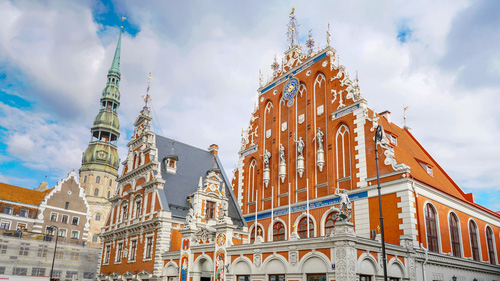
Latvia will receive €4.6 billion in Cohesion Policy funding between 2021-2027 to support economic and territorial cohesion, and social fairness. Latvia will invest the EU funds in the green and digital transitions, in boosting innovation in the economy, and in healthcare and social services.
The details and strategy for these investments are set out in the Partnership Agreement between Latvia and the Commission that is formally adopted today.
Investments in social fairness
€1.2 billion from the European Social Fund Plus (ESF+) and the ERDF will be invested to implement the European Pillar of Social Rights. The funding will improve access to affordable and quality social services, healthcare and community-based long-term care.
Latvia will also use the funding to invest in people's skills, from young to old. In particular, funds will be used to train people in skills needed to master the digital and green transitions and to improve access to education, from early childhood education to vocational education and training. This will help Latvia to meet its Porto social targets in employment and training.
Cohesion Policy funding will equally support social housing for the most vulnerable groups, and activation measures for jobseekers and people at risk of unemployment. Latvia will use the funding to invest in the social integration of persons at risk of poverty.
Finally, today the Commission also approved Latvia's programme worth €32.5 million to provide food and basic necessities to more than 59,000 of the most deprived persons every year, including people fleeing Russia's invasion of Ukraine.
Members of the College said:
Commissioner for Cohesion and Reforms, Elisa Ferreira, said: 'Thanks to Cohesion Policy, Latvia has experienced increased prosperity, better infrastructure and improved access to services and quality of life. The measures jointly agreed in this Partnership Agreement will further boost the development of the country to make a leap forward towards a more competitive, greener, and fairer economy. Investments will generate long term benefits for all people in Latvia.'
Commissioner for Jobs and Social Rights, Nicolas Schmit, added: 'I welcome Latvia's initiative to use ESF+ funding to help equip workers with the skills needed for jobs in-demand. This Partnership Agreement will also bring improvements to social care, healthcare and education in Latvia. At the same time, the €32.5 million in funding to provide food and basic material assistance announced today will provide a lifeline to those in need.'
Background
Under Cohesion Policy, and in cooperation with the Commission, each Member State prepares a Partnership Agreement, a strategic document for programming investments from the Cohesion Policy funds – ERDF, ESF+ and the Cohesion Fund – the JTF and the EMFAF during the Multiannual Financial Framework.
The Partnership Agreements focus on EU priorities, laying down the strategy and investment priorities identified by each Member State. Latvia has set out three national programmes and 10 cross-border programmes for the implementation of the investments on the ground, including the indicative annual financial allocation for each programme.
Moreover, the Partnership Agreement reflects Latvia's strong commitment to the coordinated use of the Cohesion Policy funds with the Recovery and Resilience Facility.
The Partnership Agreement with Latvia is the 23rd to be adopted following those of Greece, Germany, Austria, Czechia, Lithuania, Finland, Denmark, France, Sweden, the Netherlands, Poland, Bulgaria, Cyprus, Portugal, Estonia, Slovakia, Italy, Romania, Croatia, Slovenia, Malta and Ireland.



